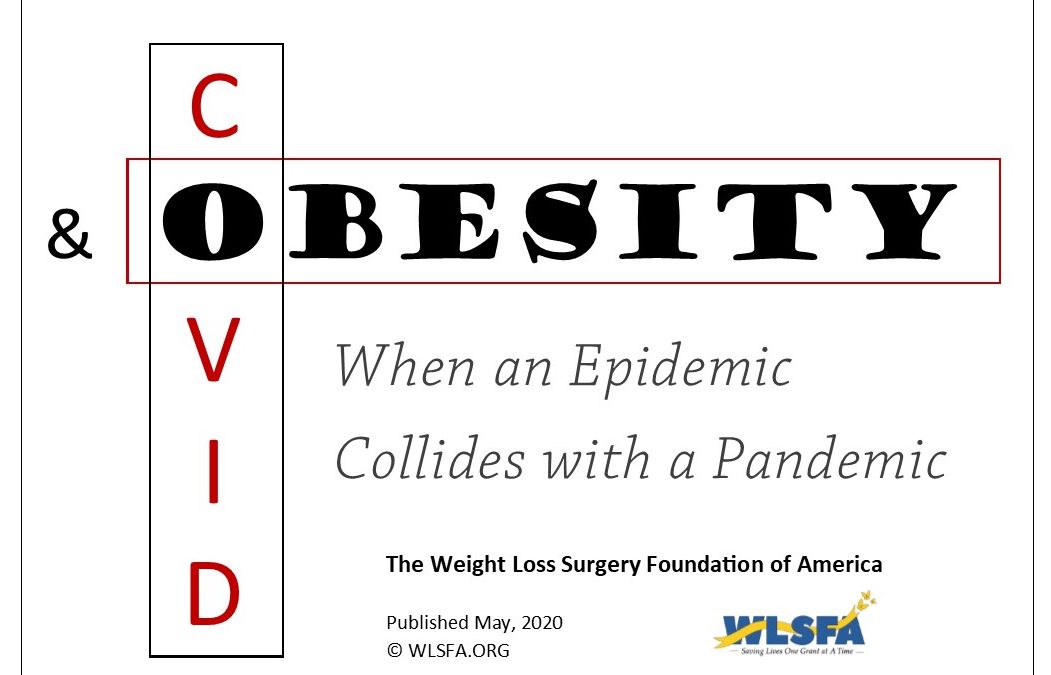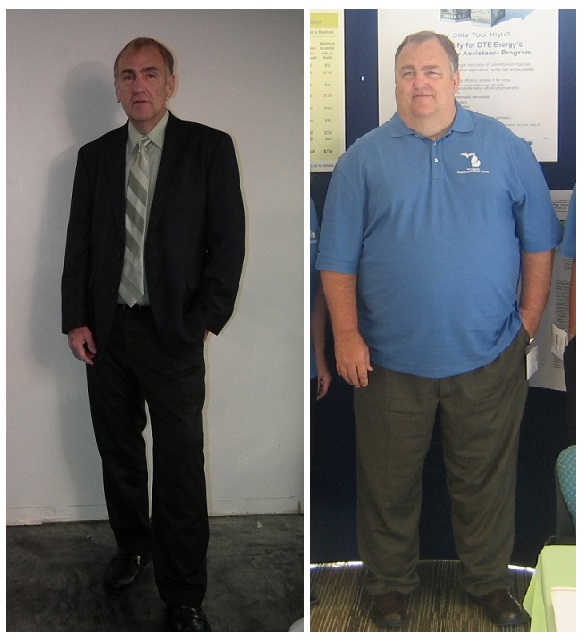
Obesity and Covid-19
The Covid-19 epidemic is upon us. Every day brings new stories of people who have contracted the illness and those who have recovered, or sadly, perished from it. Civic leaders and medical professionals are scrambling to develop methods and means to fight the spread of the virus and to protect us from exposure. The impact of this pandemic is wide and deep, and has made significant changes across all aspects of our society.
The virus is highly transmittable, and although some people contract the virus asymptomatically, others suffer extreme complications, including death.
Health professionals say that as with other respiratory viral infections, the most vulnerable among us for serious and potentially life-threatening complications are the elderly and people with lung or heart disease or compromised health defenses. As coronavirus attacks the lungs and breathing mechanisms of the body, anybody with a pre-existing respiratory ailment would be vulnerable to the virus and likely to suffer more extreme complications if infected.
The obesity epidemic is also upon us. The Center for Disease Control and Prevention (the CDC) estimates that 42% of all adults in the USA are obese. People with obesity often have comorbidities, including diminished lung capacity, inflammation, and diabetes.
When Epidemics Collide
What do you call the collision of two epidemics? I’m not sure there is a name for it but I am certain the outcome isn’t good – and leads us to this question:
Do obese Covid-19 patients have a higher rate of extreme complications, or even death, than the non-obese?
The data seems to indicate they do.
Obesity is a Major Complication
Data shows that obese Covid-19 patients have an increased risk of developing pneumonia and the need for invasive mechanical ventilation.
Obesity has been found to be the second strongest independent predictor of hospitalization (due to Covid-19 illness), after old age.
“Obesity is commonly associated with metabolic syndrome, which increases your risks for diabetes, hypertension, heart and blood vessel disease, and ultimately kidney disease.” Says Dr. David Nazarian, a Beverly Hills-based physician. “So, in a nutshell, a person who is obese can check off five of the risk factors that the CDC has placed as risks for more severe COVID-19 infections.”
The CDC has pinpointed “severe obesity” – those with a Body Mass Index (BMI) of 40 or more — as being one of the groups most “at risk for complications” when it comes to coronavirus.
“I suspect this [obesity] is America’s COVID Achilles heel and may cause higher morbidity and mortality rates than other regions [countries],” noted Dr. Jennifer Lighter, hospital epidemiologist at New York University’s Langone Health.
Now some experts believe obesity may explain why otherwise healthy young people are needing hospitalization and are dying from Covid-19.
Researchers have found that obesity is especially prevalent in the hospitalization of young people who contract the pathogen. An April 17 article published in the Morbidity and Mortality Weekly Report underscored that of 180 patients hospitalized from March 1 to March 30, the most prevalent underlying condition was obesity – a condition that afflicted more than half.
People under 60 years of age are generally considered at lower risk of developing severe COVID-19. Nonetheless, “In individuals less than 60 years old, they [obese people] were two to three times more likely to be admitted to the hospital or ICU, and for the morbidly obese, fatality is three times the rate than for non-obese COVID-infected individuals” noted Dr. Lighter.
Obesity can be an Issue in Treatment
According to the World Obesity Federation, “Persons with obesity who become ill and require intensive care present challenges for patient management as it is more difficult to intubate patients with obesity.” The Federation also adds, “It can be more challenging to obtain diagnostic imaging as there are weight limits on imaging machines, patients are more difficult to position and transport by nursing staff and, like pregnant patients in ICUs, they may not do well when prone. In general, health systems are already not well set up to manage patients with obesity.”
Dr Brunilda Nazario, lead medical director at WebMD, points out that obese patients are “difficult to intubate, and may need specialized equipment that may not be widely available. “Unfortunately, the vast majority of our health care system is not well equipped to manage the critical care of a patient with obesity,”
People suffering obesity often avoiding seeking medical care to avoid judgement of others or out of embarrassment or shame. However, it is the obese that should take extra precautions to prevent contracting the coronavirus, and they must seek appropriate medical care when needed.
“The stigma that people with obesity face is unjustified, this is a medical condition and should be viewed and addressed as one, especially within the health care system,” Dr. Nazario said. “Because the rates of obesity continue to climb in the U.S., and we don’t know when the pandemic will end, we need to address this simultaneously.”
Living in the World of Covid-19
Fortunately, the vast majority of us will not contract the virus – or if we do, it will be asymptomatic, or with minimal complications… a bad cold, a mild flu. We will however, be dealing with one form or another of disruption to our daily routines due to Covid-19.
The WLS lifestyle
It is almost impossible to overstate or fully grasp the impact that the coronavirus made to our daily lives. This disease has compelled monumental changes to virtually every aspect of our society – religious, entertainment, political, economic, educational, medical and social.
The typical WLS lifestyle frequently depends upon a system of planning and implementing daily routines such as food prep, structured meal times, scheduled exercise periods, and group support meetings. As these routines are an integral reason that obesity was overcome, their absence or disruption will increase the likelihood that the WLS patient will experience a disruption in lifestyle, resulting in setbacks.
Diet and Nutrition
While quarantine and sheltering-in-place have created a hardship for everybody, there are specific hardships that hit the WLS community differently than the general population. WLS patients must manage their nutrition in a specific manner which has a greater dependency on access to fresh food – both vegetables and proteins. This becomes difficult when sheltered in place. The result may be that the WLS patient is forced to turn to less nutritious sources of food such as canned or frozen, chemically infused and processed ‘foods’, that have:
- more salt, sugar, and trans fats
- more simple, less complex carbs
- chemical additives
- higher calories
- less protein
WLS patients must find a way to maintain access to fresh foods – through delivery services, online ordering/drive up pick up, or other of the creative ways that grocers are finding to keep the flow of fresh foods safely accessible to the public.
Most WLS Patients take vitamin and mineral supplements. These nutrients are vitally important to the wellbeing of the WLS patient and must not be missed. Being sheltered in place makes a trip to the store to resupply vitamins difficult. Thankfully most of the vitamin manufacturers serving the WLS community provide online ordering and shipping of their products.
Support
It is said within the WLS community that “They operate on your stomach, not your head,” in reference to the significant role that our mental and emotional states play in both the onset of obesity and the effort to defeat it. Group support sessions are one of the most popular and utilized forms of therapy that help the WLS patient deal with the mental and emotional side of fighting obesity. In-person group meetings in the era of social isolation are not possible. The loss of a regular support group benefit will increase the likelihood that the WLS patient will experience a disruption in lifestyle, resulting in setbacks and may realize regain.
Support is so very important to the long-term success of the WLS patient. If local support groups are not available because of quarantine or rules against group meetings, there are many online options available that can provide this valuable service. These groups meet via Facebook, Goggle Hangout or Zoom. Most have a ‘mission’ or focus, such as being targeted at people who have had a specific procedure such as the sleeve, or gastric bypass… that are from certain hospital systems or regions of the country… that focus on addiction… that focus on mental health… etc. Look at many, find one or more you like and join!
Exercise
The two main calorie factors affecting weight loss and weight control are managing the calories taken in from food and drink – and the calories burned up through exercise and activity. We have discussed the challenges of eating well as we deal with Covid-19, well it is just as important to find a way to keep exercise and movement in our daily activities, even when gyms are closed and social distancing makes taking classes and group exercise impossible. Fortunately there are many options for getting exercise even while sheltered-in-place. Websites and YouTube videos of Zumba, yoga, aerobic, weight lifting, Tai Chi, stretching and virtually any other form of exercise expression are readily available. Find one that fits your likes and needs and join it with the same regularity and enthusiasm that you have attended your local gym classes. The web is also a great place to find options for exercising at home or in your own yard. Continuing to get exercise is probably the easiest Covid-19 challenge to overcome.
Thriving During Covid-19
Living during the Covid-19 pandemic certainly adds many challenges to the WLS lifestyle that many have utilized to master the symptoms of obesity and reclaim control over their lives. The common fear is that these challenges might cause us to revert to other lifestyles – like the lifestyle that exacerbated the symptoms of obesity in the first place.
Don’t fall for it.
The more things change, the more they stay the same. The secret to a WLS lifestyle hasn’t changed. Covid-19 or not… it is this:
Eat your protein first
Get daily exercise (body and mind)
Drink water and stay hydrated
Avoid sugar and simple carbs
And…
You know the list. It hasn’t changed, in… well, in forever. Times change. Circumstances morph. Conditions evolve. Situations develop. Just realize that the same WLS lifestyle we have been following and has lead us toward wellness, can be followed in any time, circumstance, condition or situation. You can find a way to make it work. Trust the plan.
The WLSFA and Weight Loss Surgery
It is clear that the presence of obesity creates a greater risk in an individual for contracting and suffering significant complications from (including death) the coronavirus. Weight Loss Surgery (WLS) is a tool that the obese can use to overcome the symptoms of their disease and decrease their risk of greater complications from Covid-19, should they become infected.
WLS is a useful, but not universally available tool for fighting obesity. It aids the patient in establishing new lifestyle practices and overcoming the symptoms of their obesity.
WLS is not universally available due to its high cost, and the fact that it is not typically covered by most health insurance policies. Therefore there are thousands of people who would benefit from WLS, if they had the means of paying for the procedure. In addition to overcoming obesity, they would also become more protected against contracting and suffering complications from Covid-19 as well as a whole host of other illnesses, ailments and diseases.
The WLSFA works to provide WLS grants to people who are referred to the surgery by their surgeon, but who do not have the means to pay for it, nor insurance that covers it. In these times of Covid-19, WLS may not only help save the life of the WLS patient, but also avoid Covid-19 complications.
It seems that “Saving Lives one Surgery at a Time”, can have a ripple effect of positive benefits.
Sources:
Obesity and Impaired Metabolic Health in Patients with Covid-19 | Nature Reviews Endocrinology | 4/29/2020 | https://www.nature.com/articles/s41574-020-0364-6
Obesity May Impact Mortality in Covid-19 Patients | George Washington University | April 27, 2020 |
https://medicalxpress.com/news/2020-040obesity-impact-mortality-covid-patients-html
Obesity and Covid-19: Theories and Blame Fill scientific Void | TCTMD.com | April 28, 2020 |
https://www.tctmd.com/news/obesity-and-covid-19-theories-and-blame-fill-scientific-void
Are America’s High Obesity Levels Leading to More Coronavirus Deaths? | Fox News | April 28, 2020 |
https://www.foxnews.com/health/is-americas-high-obesity-levels-leading-to-more-coronavirus-deaths

